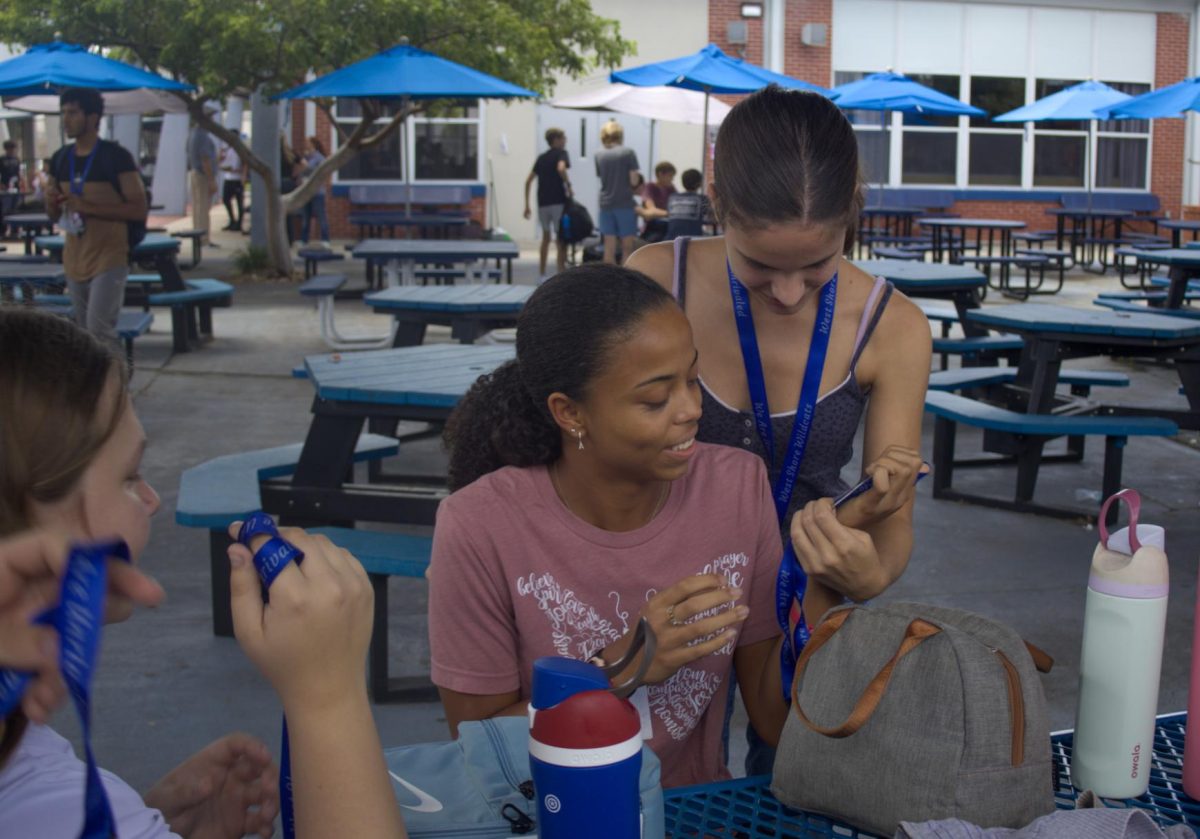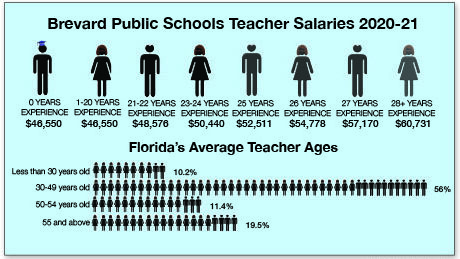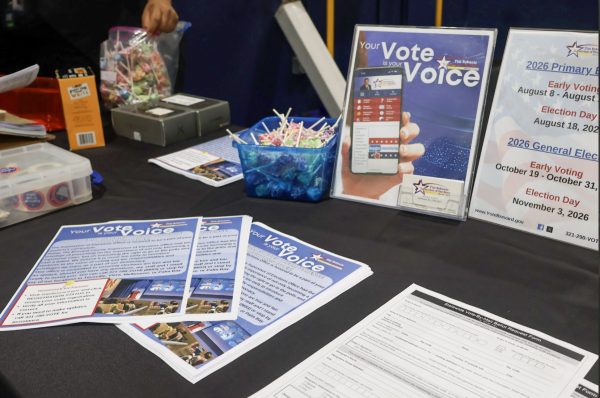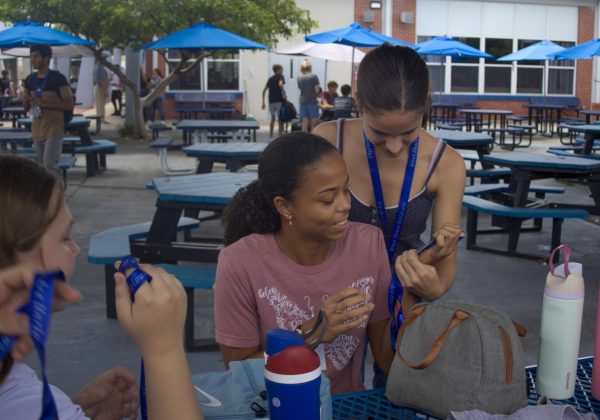Salary squeeze
States hopes pay boost for new teachers will solve instructional shortages
Magdalena Molledo has been a Brevard Public Schools teacher for 25 years and during that time has consistently earned outstanding performance evaluations. So when Brevard Pubic Schools raised minimum teacher pay from $39,222 to $46,550, Molledo should have been celebrating — but she wasn’t. She, along with all other teachers who were making above $46,550, received an $850 raise. In short, Molledo annually earns $850 more per year than a beginning teacher with no experience.
Gov. Ron DeSantis decided to address Florida’s lagging salaries for beginning teachers — which last year averaged $37,696 per year — because of a shortage of qualified teachers in science, English, mathematics, English for speakers of other languages, reading, technical education and exceptional student education. In addition, postsecondary institutions were not producing enough graduates to meet the needs of Florida’s K-12 student population.
“It’s a mixed bag,” said Johnathan Hilliard, the second vice president of the Brevard Federation of Teachers. “Of course, we’re extremely excited for our new teachers and young people coming fresh out of college and into the profession.”
But Hilliard called the bill a “bruise to [the] veteran teachers who rode out the tough time and the recession.”
“There could have been a plan for veteran teachers,” Hilliard said. “The profession has remained consistent and substantial because of the veteran teachers. Back in [2008] and [2009] we had that salary freeze, and five years with no salary increase. So there would be no solid industry for our young teachers to come into if it were not for our veteran teachers. So it is disappointing that our governor did not have a plan.”
Of the $500 million the state put toward the bill, $400 million was allocated to new teachers and the rest was allocated to instructional personnel and veteran teachers.
“Does [the bill] leave a sour taste in the mouth of some of our veteran teachers? Yes,” Hilliard said. “But I think the purpose was to raise the minimum wage, entice young people fresh out of college to enter the profession and to keep those newly in the profession to stay the course.”
Hilliard said there was some flexibility school districts could exercise regarding how the money was spent, including the potential to adjust the minimum amount of pay a teacher could receive. With the new bill, Florida rises from 26th to fifth in the nation for base teacher pay.
“You’re talking about the first governor to put $500 million on the table for education,” Hilliard said. “[That] hasn’t been done in the time that I’ve been in Florida, since [2003].”
According to Hilliard, the school board and BFT worked to negotiate a $850 raise for veteran teachers, prior to DeSantis’ bill. While Hilliard said that amid the financial struggles of a pandemic this bill was a “small success when we look at the greater picture,” some discontent remains.
“If somebody is coming into the profession and they see an inequity where they see that veterans of the industry are not treated well, that may keep them from coming in regardless of salary,” Assistant Principal Glenn Webb said. “They say teachers don’t go into teaching for the money, that they understand going into the profession that it’s not one of the better-paid professions. But that doesn’t make it right to not pay them what they’re worth.”
Brevard County teachers received the revised salary as of Nov. 30. The school board’s initial goal, according to Hilliard, was to get the money out before the holidays. Retropay was granted to teachers to compensate for the time between July 1 and Nov. 30.
“I think for a short time there will be an influx of new teachers going into the education system,” said Alex Nazario, a software developer and substitute teacher in Central Brevard County. “For veteran teachers, this will and has definitely lowered the attractiveness of education as a career. For newer teachers, the pay raise may superficially boost the attractiveness of education, but later down the line they may share the same negative sentiment as their veteran colleagues.”
Before becoming a substitute teacher, Nazario said he had considered a career in education.
“The two biggest factors for me was the pay and stress,” Nazario said. “For me, I value my personal time and there’s a lot of behind-the-scenes work teachers do. Teachers are constantly in meetings, setting up conferences with parents, correcting unwanted behaviors, preparing lessons, grading papers, adjusting lesson plans and so much more.”
In the same bill promoting a raise for newer teachers, DeSantis also eliminated the Best and Brightest program, which gave salary bonuses to teachers based on their SAT or ACT scores during their time in high school and the school system’s annual evaluation of them. This idea was not highly praised by educators across the state, including Magdalena Molledo, who previously taught STEM classes at West Shore and now teaches at Satellite High School.
“I thought it was very ill-designed and I don’t think it helped attract many new teachers,” Molledo said, who teaches honors biology and science research. “I guess [the lawmakers] realize veteran teachers will stay regardless of what the Department of Education decides. Also, veterans still have many benefits newer teachers don’t, such as continual contract.”
Molledo said she agrees that for some teachers out there, teaching is more about the purpose of the career than the pay received from it.
“Veteran teachers will stay,” she said. “Even though the pay is not that great and the hours are long, it is still a fulfilling career. However for some they will stay only until they find something better, which is easier to do [now] than it used to be.”
Hilliard described teaching as a tightrope between science and art, adding that the emotional investment of teaching is what attracts people who “just want to make that difference.”
“If you’re staying, it’s for the kids because you find joy in what you do,” Webb said. “That’s really what it’s all about.”
— Editor in Chief Sophia Bailly contributed to this story.

I’m a first-year, sophomore staff writer. I love discussing current events and issues and my favorite treasure in the world is my cat.
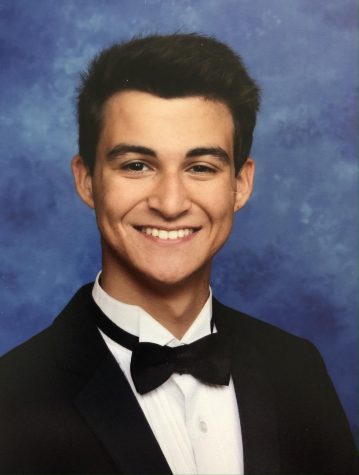
This is my second year writing for the Roar. I am a senior with 5+ years of Digital/Graphic Design experience and this is my first year as Graphic...


![Sophomore Isabelle Gaudry walks through the metal detector, monitored by School Resource Officer Valerie Butler, on Aug. 13. “I think [the students have] been adjusting really well," Butler said. "We've had no issues, no snafus. Everything's been running smoothly, and we've been getting kids to class on time.”](https://westshoreroar.com/wp-content/uploads/2025/08/IMG_9979-1200x800.jpg)






















